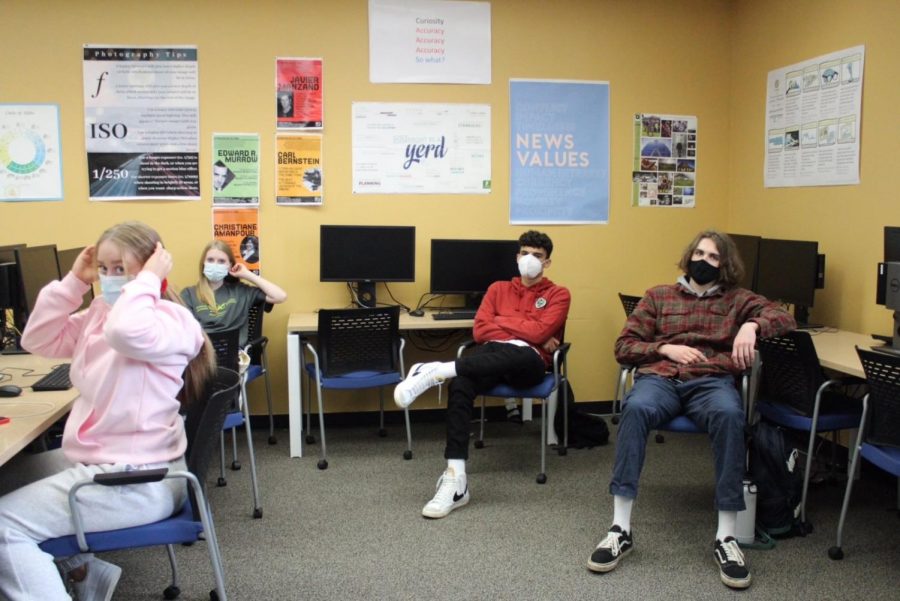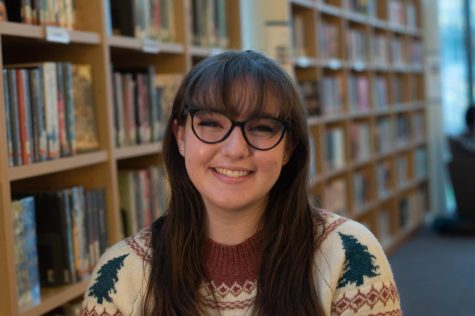A “Love Letter From The Students To The School”: Yearbooks Are Looking Different This Year
Photo courtesy of Bella Chalmers
“I’m just real proud of the whole team for coming through and making this happen,” senior George Gilmore said.
March 31, 2021
Despite the many changes to the 2020-2021 school year due to the COVID-19 pandemic, The Accipiter — La Salle’s official yearbook, created by a student-run team advised by Band and Yearbook teacher Mr. John Donnelly — is focusing on adapting.
“I think we’ve kind of broadened our horizons and looked for a lot more opportunities to take photos,” said senior George Gilmore, who is a part of the yearbook team. “I feel like COVID has definitely held us back in some sense, but it’s also given us a new topic to focus on when creating the yearbook, and there’s kind of this new aspect to making the yearbook now.”
Last year, the yearbook team held an on-campus drive-through for students to collect their yearbooks in August, compared to the usual completion time. This is because the printing company that the team uses, Herff Jones, shut down for a month due to COVID-19.
If the yearbook had been finished in April as it typically is, a 12-page addition called a “supplement” would have been printed soon after, which includes things like St. La Salle Day, the spring musical, spring sports, graduation, and more that happen after the yearbook is printed.
However, with a later release date, last year’s yearbook team was able to include the full year’s contents in the original book — no supplement required.
This was one of the main reasons the yearbook team chose to opt for a fall release this year. Mr. Donnelly doesn’t make decisions for The Accipiter himself, however. “I really just present the options of what other schools do,” he said. “I kind of sit back and help guide.”

For a decision like this, as well as decisions on what should and should not be included in the yearbook, the class typically holds a whole-group Zoom meeting to discuss the pros and cons of the choice.
“The whole concept of the book is that, really, I don’t do any of it, or I do very minimal work for it,” Mr. Donnelly said. Sometimes Mr. Donnelly takes photos for the yearbook, especially with COVID-19 creating a lot of restrictions for who can go to certain events, but otherwise, “they do it 100 percent.”
A fall release for the yearbook means that seniors will need to come back to the school after they have already graduated to pick up their books. “I’m optimistic,” Mr. Donnelly said. “I think seniors will come back and want to see their books.”
And for the rest of the student body who aren’t graduating, in September the yearbook team is planning on delivering yearbooks to students’ Falcon Formation classes. Or, if that doesn’t work out due to COVID-19 or otherwise, the drive-through delivery from last year is still an option.
Because of the student-run decision-making process, the class tends to focus on what their interests are and includes those in the yearbook. “We don’t have unlimited pages,” Mr. Donnelly said, so the team writes about their passions. “Yearbook is like a love letter from the students to the school.”
To incorporate as many things into the yearbook as possible, Gilmore said the team has been “dividing and conquering… we have to go out and make our own decisions and set aside time to get things done on our own.”
The students enrolled in yearbook this year are all new to the class other than senior Bella Chalmers, which Mr. Donnelly said isn’t uncommon for the class. Because of this, to make sure the group has a solid foundation before approaching the yearbook itself, Mr. Donnelly dedicates the first two and a half months of his curriculum to focus on writing etiquette, tenses, grammar, caption writing, design, and more.
“This yearbook staff is just top-notch,” Mr. Donnelly said. “I love being part of their team and I love seeing their process, all the time.”
After those two months, the yearbook staff divided into two main groups — one led by Chalmers, and the other led by senior Caroline Kiesz. The teams divide the yearbook by pages, and Mr. Donnelly works with Chalmers and Kiesz to break the book down into smaller deadlines.
“Originally, we didn’t have any sports, because we didn’t think any sports were going to be involved,” Mr. Donnelly said. But as sports seasons are restarting, the yearbook team has adapted the yearbook to include them.
Freshman Ava Goodwin, who joined the class to “see what the school’s about” since it is her first year at La Salle, attended her first soccer game this year to take photos. “I’ve never used a camera before now,” she said.
Senior Michael Drenner has also been working on his photography through the yearbook. “I’ve been playing football for a while, and my favorite thing after the games is to look at all the cool pictures they get from it,” he said. “So I just thought it would be cool to take some of those pictures.”
For sports specifically, taking photos has been “pretty difficult,” Drenner said. “Especially because we can’t just get pictures of crowds of people at football games.”
Despite the challenges, “we’re doing everything we can to keep the same content that we’ve had always in the past,” Mr. Donnelly said. “It’s just going to look a little different.”
As of now, the plan for the yearbook is for it to be divided into five sections, including student life, academics, groups/clubs/activities, a reference section for student glamour shots, and an index.
While some of the content in the yearbook will focus specifically on the COVID-19 pandemic, with masks, school closures, hybrid learning, curriculum changes, and more, “every page is literally going to have something that is what COVID has done to affect their experience in that activity or learning environment,” Mr. Donnelly said.
But despite all of the changes, “I don’t think we’re going to be losing anything from previous yearbooks,” he said.





